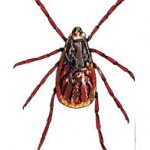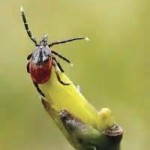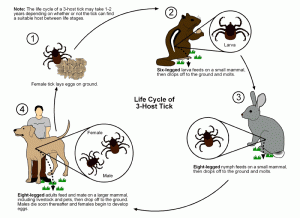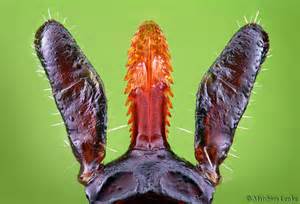
The other day at bell choir rehearsal we were practicing a tricky piece that had a riff of competing doublets and triplets, and I requested that we drill on several problematic measures. Just as we launched into the piece, I felt a tick marching across my forehead. The bells in both of my hands prevented any discrete removal. Since we were rehearsing for my sole benefit, I tried to stay focused and ignore the patter of little feet. However when the tick turned northward and headed into my scalp, I said, “Sorry to interrupt the rehearsal, but I’ve got to get this tick out of my hair.”
As I deftly extracted it, I noticed the slack-jawed stares of my musical mates who looked at me as the epitome of pestilence, as someone who was unaware of the simple courtesy of delousing before a social event. I was startled and dropped the tick, further exacerbating the ambient anxiety. The very fastidious women next to me insisted that we find the tick and kill it before proceeding. She spotted it crawling near to her open-toe sandal and before I could pick it up, she tried to impale it with a mechanical pencil. The tip snapped and the tick pinged out of sight. We continued with our rehearsal, but the choir was clearly distracted by the free-ranging blood sucker in our midst.
Several years ago, I would have had the same horrified reaction as the bell choir, but living next to a prairie has given me a hard-won respect for the ticks. Yes, I was originally appalled at the thought of a tick taking up residence in the succulent folds of my body. I never strayed from a well trodden path and always tucked my pant legs into my socks – even if I was just walking down the driveway to get the mail. I would hesitate to take a long walk by myself, fearful of the ensuing panic if I sensed a tick on an unreachable part of body without a companion to pry it off.
The threat of Lyme disease was not the issue, since our neighborhood ticks are the larger brown dog ticks, and not the diminutive deer ticks. It’s just that as a general rule, I find blood suckers unnerving, and considered ticks the worst. Leeches are easily avoidable and highly visible. Mosquitoes don’t linger; they suck blood quickly with a smash and grab strategy. In contrast, ticks are stealthy and crafty; they could crawl all over my body and can suck for days on end. But now I just don’t let them. I do a careful tick check each night. Peeling them off calves, thighs, arms, forearms and a neck has become nothing more than an activity of daily living.
I am at peace with my neighborhood ticks.
In fact, I look forward to the arrival of ticks as a sure harbinger of spring as they emerge from the leaf litter and seek their first blood meal. They climb up vegetation to a height that is consistent with the size of their prey. When ticks detect carbon dioxide, heat, shadows or vibrations, they assume the “questing” position with their two front legs waving in front of them ready to take advantage of a host brushing by. If their efforts are unsuccessful and they begin to dry out from exposure, they crawl back down into the moist leaf litter and once rehydrated they repeat the process.
 Our dogs are an ideal host for the tick as they romp though the brush at the side of the path. The dab of anti-tick goo on the dogs’ neck prevents the ticks from biting and embedding, but the dogs transport ticks into our house in droves where they drop off and search for new juicy prospects, namely us mortgage payers. Our dogs are poorly trained, and thus the ticks can assume the position and “quest” on the furniture. We didn’t appreciate our co-habitants until the ticks showed up in our bed. When he shaved in the morning Nick would find a couple ticks on his neck. This led to frantic tick checks before getting into bed, carefully making the bed in the morning to keep the ticks out of the sheets, and diligently keeping the doors closed during the day to deny access to the dogs. However, this was not fool proof. One night there was an old gummy tennis ball on the bed, a sure sign that there had been a break down in our vigilance.
Our dogs are an ideal host for the tick as they romp though the brush at the side of the path. The dab of anti-tick goo on the dogs’ neck prevents the ticks from biting and embedding, but the dogs transport ticks into our house in droves where they drop off and search for new juicy prospects, namely us mortgage payers. Our dogs are poorly trained, and thus the ticks can assume the position and “quest” on the furniture. We didn’t appreciate our co-habitants until the ticks showed up in our bed. When he shaved in the morning Nick would find a couple ticks on his neck. This led to frantic tick checks before getting into bed, carefully making the bed in the morning to keep the ticks out of the sheets, and diligently keeping the doors closed during the day to deny access to the dogs. However, this was not fool proof. One night there was an old gummy tennis ball on the bed, a sure sign that there had been a break down in our vigilance.
As our first tick spring progressed, I realized that ticks have a definite preference for Nick. Given the choice of both of us in bed, the ticks always chose Nick; I never woke up with a tick on me. When Nick took the dogs for a walk, he always stayed right on the mowed path, out of contact with ankle-high tick-laden grass. Nevertheless, he would routinely find four or five ticks on him when he returned. Ticks are exquisitely sensitive to carbon dioxide. In fact, scientists can conduct a tick census by dragging a block of dry ice through a field. Therefore, my working theory is that Nick out-gases more carbon dioxide than I do. Or perhaps I am the outlier, and produce pitiful quantities. Either way, this discrepant CO2 theory is consistent with the fact that Nick also preferentially attracts mosquitoes, so if I stay close, he will siphon any blood suckers away from me. I am thrilled with this deterrent strategy.
Nevertheless, Nick and still I needed to develop an efficient killing method. Ticks have a hard covering called the scutum that prevents the simple smash or squish. The most reliable technique was to drown them in the sink or toilet, but this required a trek into the kitchen or bathroom, a particular inconvenience in the middle of the night. One morning Nick found a tick between his thumb and forefinger. Apparently he had plucked a tick during the night and kept it there until morning. This was not a reliable strategy. Nick ultimately devised the happy solution of scissors coupled with a wastebasket near the bed or couch. We could simply cut off their heads and deposit the body parts.
My journey from tick phobia to equanimity has now matured into wonder and awe as I began to appreciate the improbable machinations of the tick life cycle – how any single ever made it close to the promised land of our bed. Females lay 2,000 to 10,000 eggs in the leaf litter in the hopes that the new born larvae will find a host, suck blood, drop off and molt into nymphs who then find a second host, suck blood, drop off and molt into adults, who will find a third host, suck blood and are then lucky enough to share the host with a mate of the same species. Pheromones then guide the two ticks together, perhaps sending the male tick up the pant leg, under the waistband, across the vast stretch of the soft and tempting torso, over the shoulder, finally reaching the female tick patiently waiting at the hair line. The female tick interrupts her feeding and rolls over so that the male can deposit a package of sperm into her genital pore. The female then completes her feeding, drops off and lays her eggs.
 A life cycle requiring three separate hosts seems fragile at best, with multiple opportunities for failure at each step. I envision a questing tick on the tip of a grass stem, day after day wildly waving his legs in a desperate search for a mate. He finally exults in his good fortune to find a pant leg and the warmth of our couch. A blast of CO2 washes over him and he makes his way towards Nick’s calf. Instead of claiming the first available patch of flesh, he inexplicably decides to explore further up the leg and as he wanders he twitches a few leg hairs. Nick, hypersensitive to movement, reaches down, grabs the tick and idly cuts his head off. Life cycle interrupted.
A life cycle requiring three separate hosts seems fragile at best, with multiple opportunities for failure at each step. I envision a questing tick on the tip of a grass stem, day after day wildly waving his legs in a desperate search for a mate. He finally exults in his good fortune to find a pant leg and the warmth of our couch. A blast of CO2 washes over him and he makes his way towards Nick’s calf. Instead of claiming the first available patch of flesh, he inexplicably decides to explore further up the leg and as he wanders he twitches a few leg hairs. Nick, hypersensitive to movement, reaches down, grabs the tick and idly cuts his head off. Life cycle interrupted.
One would think that the grinding forces of evolution would come up with a more efficient life cycle, but an initial oversupply winnowed down to the lucky few is a time-tested strategy to overcome harrowing odds. Ticks have been around for some 393 million years and sucked the blood of dinosaurs. They were here before we came, and will be here after we go.
Biology has always been a sustaining interest of mine and after college I took the well-trodden path to medical school. Now I wonder if I had been exposed to ticks some forty years ago whether a tick-specializing acarologist would have been my calling. I would have known that I was not cutting the head off a tick, since the head is fused to the abdomen, but instead I was cutting off the tick’s paired sensory palps and chelicerae, which house the barbed central blood-sucking and probing device called the hypostome.
 Perhaps I would have been transfixed by the mechanics of the ticks’ specialized egg-waxing organ that keeps their eggs from drying out in the leaf litter. Perhaps I would be so career-invested in ticks that I could become aroused by the following description of tick copulation by B. Feldman-Muhsam, one of the founding giants of acarology:
Perhaps I would have been transfixed by the mechanics of the ticks’ specialized egg-waxing organ that keeps their eggs from drying out in the leaf litter. Perhaps I would be so career-invested in ticks that I could become aroused by the following description of tick copulation by B. Feldman-Muhsam, one of the founding giants of acarology:
“The male introduces the hypostome and chelicerae into the female genital aperture and the palps splay out adhering to the female cuticula. After several minutes of intermittent movement into and out, the male extrudes a transparent balloon, the ectospermatophore, into which, after one to two seconds, he injects his sperm.”
At this point Dr. Feldman-Muhsam, hunched over his microscope, reaches for a hankie to mop his brow as he watches the ticks reach their climax.
“Extensive contortions of the body are required in order to force the spermatophore forward to where it can be grasped by the chelicerae and implanted into the female. The male does not remove its mouthparts from the female’s genital pore until the spermatophore has arrived near the aperture.”
I could have joined the Acarology Society of America. Hell, I could have been its president, based on my ground-breaking work on tick saliva, which multi-tasks as an anticoagulant, antihistamine and a cement that keeps the tick in place. It might even turn out that tick saliva could be repurposed into a vaccine against Lyme Disease. Research dollars would pour in. Dare I think Nobel?
No, I’ve missed my chance. It’s too late for glory, laud and honor, but the lowly tick has taught me respect for the complexity of all living creatures. As I gaze at a tick balancing on my finger tip, I know that there is fascinating world at the edge of the prairie, on my doorstep, in my couch and crawling up my upper arm.
The missing words in the following poem are anagrams (i.e. share the same letters like spot, post, stop) and the number of asterisks indicates the number of letters. Your job is to solve the missing words based on the above rules and the context of the poem. Scroll down for answers.
Tick Biology
Ticks await on the **** of grass blades just out of sight,
Then crawl up your pants, looking for soft flesh to bite.
Their hypostome pierces the skin, and they dig right in,
Using an anticoagulant in their **** to keep the blood thin.
You certainly don’t want the diseases that a tick transmits,
So right now check your belly button, hair line and both arm****.
Answers; tips, spit, pits
Follow Liza Blue on:

Share:









